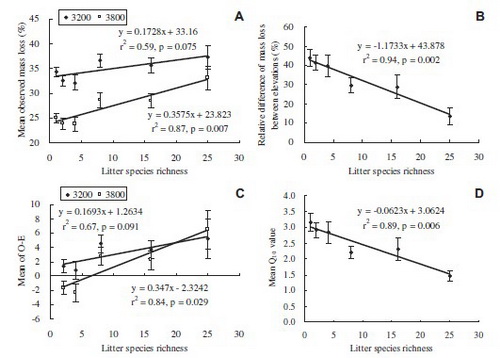Shiping Wang and his group tested the hypothesis that high litter diversity would reduce the magnitude of effects of climate and environmental change on MLML with 0.5/1 mm litter bags and sampling once after 1 yr of decomposition, using 51 combinations of litter mixtures from 25 dominant species at 3200 and 3800 m elevations on the Tibetan Plateau.
Generally, the study supported their hypothesis. High temperature (i.e. lower elevation) reduced the dependency of MLML and non-additive effects on species richness. Species composition significantly affected MLML and its Q10 (i.e. the ratio of litter mass loss rate at a temperature T1 that is 10 °C lower than a temperature T2) when species richness was less than 8. Shrubs significantly decreased the Q10 of MLML when the species richness of litter mixture was less than 4.
These findings suggest that the influence of future warming on MLML may depend on the balance between the magnitude of the impacts of climate change on shrub invasion and loss of species diversity in alpine region.

Fig. The effects of litter species richness on mean observed mass loss (A), relative difference of mass loss between elevations (B), non-additive effect (C) and temperature
sensitivity of mixed litter mass loss (Q10) (D). Bars in Figures are standard errors.
Additional Information:
1 Author Information:Jichuang Duan, Shiping Wang, Zhenhua Zhang, Guangping Xu, Caiyun Luo, Xiaofeng Chang, Xiaoxue Zhu, Shujuan Cui, Xinquan Zhao, Wenying Wang, Mingyuan Du
Correspondence: Shiping Wang (e-mail: wangsp@itpcas.ac.cn).
2 Published:
Soil Biology & Biochemistry 57 (2013) 841-847
